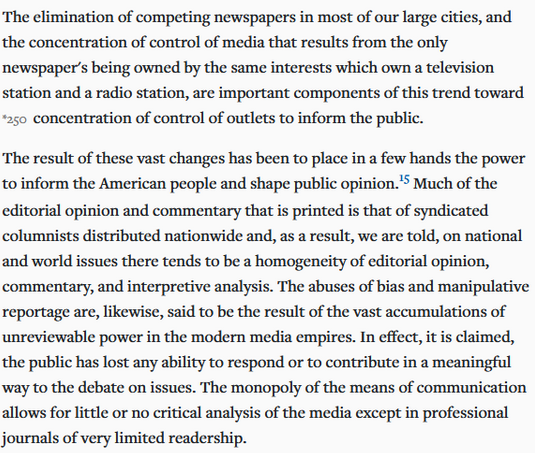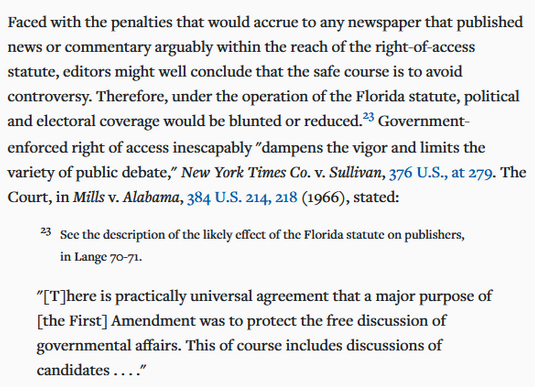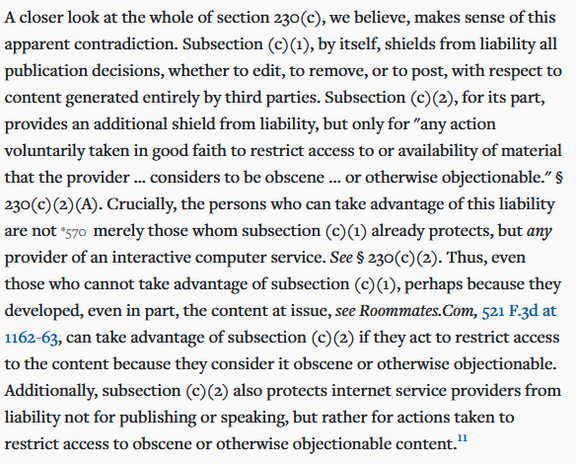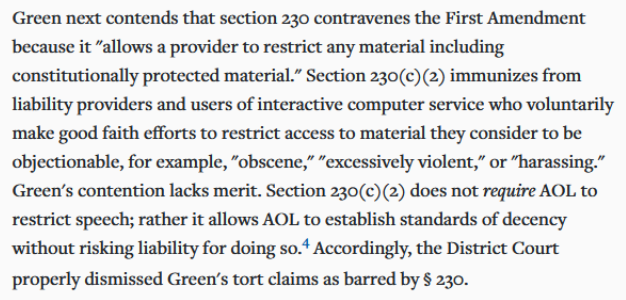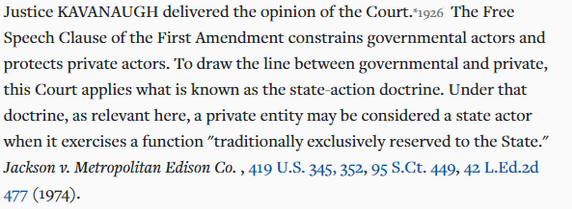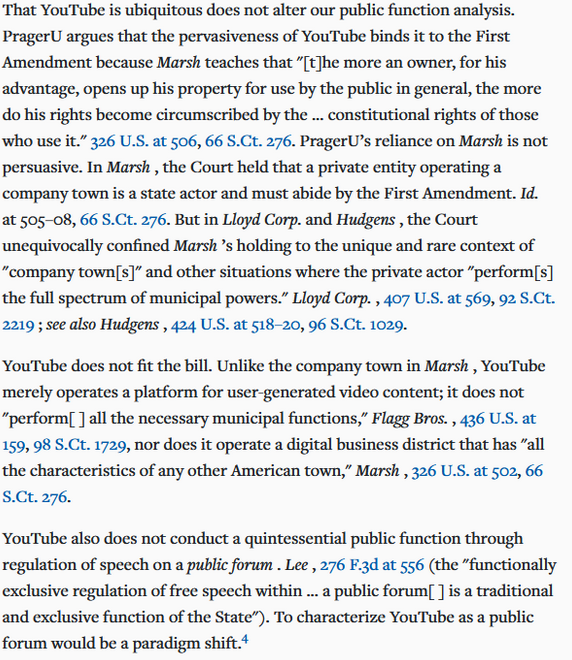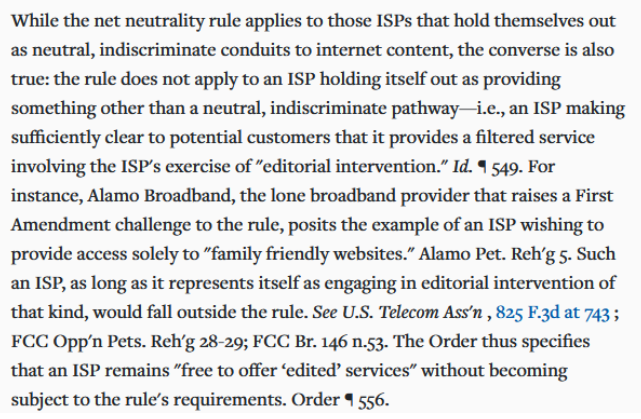1/ In @lawfareblog, we ( @berinszoka & @aricohn) make mincemeat out of Professor Hamburger's recent @WSJopinion op-ed, which fundamentally misunderstands #Section230 & the First Amendment, and proposes a solution that doesn't even address his complaint. https://www.lawfareblog.com/wall-street-journal-misreads-section-230-and-first-amendment
2/ Hamburger's errors make sense once you notice his claim that there’s "little if any federal appellate precedent upholding censorship by the big tech companies."
In reality there's plenty of such precedent, and if he'd bothered to look for it, he’d have realized a few things:
In reality there's plenty of such precedent, and if he'd bothered to look for it, he’d have realized a few things:
3/ First, it's not—as Hamburger claims— #Section230 that gives websites a "license to censor with impunity" (PS, if it's not the government doing it, it's not censorship)
What *does* give websites a license to moderate content with impunity is… … the First Amendment
… the First Amendment 
What *does* give websites a license to moderate content with impunity is…
 … the First Amendment
… the First Amendment 
4/ Like newspapers, website owners have an absolute First Amendment right to refuse to carry the speech of others .
5/ In fact, the Supreme Court has rejected the exact argument made about social media "monopolies": that consolidation and market share can overcome that constitutional right & force them to carry third-party content against their wishes. https://casetext.com/case/miami-herald-publishing-co-v-tornillo#p254
6/ Second, had Hamburger read the ample case law upholding websites' immunity for content moderation decisions under #Section230, he he’d know that he misidentified the key provision of the law. It is (c)(1) that provides primary immunity, not (c)(2)(a).
7/ §230(c)(1), which states that website owners cannot be held liable as the publisher of third-party content, has been held to immunize "traditional editorial functions," which includes "whether to publish, withdraw, postpone or alter content." https://casetext.com/case/zeran-v-america-online#p330
8/ §230(c)(2)(a) is not made superfluous by (c)(1), as the Trump administration and Hamburger seem to think. It provides an additional immunity that applies even where the website owner may have been responsible, in part, for the creation of the content. https://casetext.com/case/barnes-v-yahoo-inc-3#p569
9/ Third on the list of things that Hamburger would have known if he'd read the precedent that he claims doesn't exist is that §230(c)(2) doesn't "privatize censorship" by allowing website owners to do what Congress itself could not lawfully do. Again, that's the First Amendment.
10/ In fact, the Third Circuit rejected Hamburger's argument when it upheld the dismissal of a suit that claimed #Section230 violated the First Amendment because it allowed website owners to moderate content protected by the First Amendment. https://casetext.com/case/green-v-america-online-aol#p472
11/ Hamburger tries to preempt this by alluding to Marsh v. Alabama—the "company town" case. But the Supreme Court has repeatedly held that, to be transformed into a state actor, a private actor must be performing functions traditionally and exclusively performed by the state.
12/ Just last February, the 9th Circuit held (in mythical "federal appellate precedent") that YouTube was not a state actor for First Amendment purposes, and therefore could not have violated Prager "University's" First Amendment rights. https://casetext.com/case/prager-univ-v-google-llc-1#p998
13/ In yet another ill-fated attempt to avoid all that pesky precedent that he didn't read, Hamburger compares social media websites to common carriers, apparently mistaking the definition of "common carrier" for "things that become very popular and widely used."
14/ Common carriage ensures that companies holding themselves out as serving all comers equally don't decide on a whim to charge certain customers more. That analogy doesn't work with social media, despite what opponents of "big tech" social media companies say.
15/ Every social media service tells users access is contingent on complying with rules, and that they reserve discretion to change and enforce those rules at will, as the 11th Circuit recently reminded Laura Loomer. Social media is an *edited* service. https://casetext.com/case/illoominate-media-inc-v-cair-fla-inc#p10
16/ In 2015, upholding the FCC's net neutrality rules, the D.C. Circuit addressed First Amendment concerns by explaining that common carriage rules wouldn't apply to ISPs telling customers to expect a service filtered by its editorial intervention—exactly what social media does.
17/ Hamburger proposes a "narrow" reading, limiting immunity for content moderation to only the categories listed in §230(c)(2)(a). Again, because (c)(1) actually provides the primary immunity, and the First Amendment protects moderation anyway, that's not really helpful.
18/ In blissfully unaware self-righteousness, Hamburger says states could pass "civil rights" laws protecting free speech from tech companies, solemnly warning that sheriffs once told Klansmen that they would not be prosecuted for suppressing the speech of civil rights protesters
19/ Of course that analogy fails because the sheriffs were announcing their intention to not enforce laws that would otherwise have required them to charge the Klansmen for such acts. Likening that to a law that actually protects a First Amendment right is nothing short of absurd
20/ And ironically, Hamburger's proposal in fact takes the side of those very same types who he cited as the bad actors that we must be wary of the government enabling: the peddlers of hate and misinformation who wish to force websites to carry their toxic speech.
21/ Under Hamburger's proposed "narrow reading," the law would protect the removal of profanity or pornography, but *not* the speech of Klansmen or Neo-Nazis, which—while constitutionally protected—surely isn't what Hamburger (or anyone decent) would allow in their own home.
22/ Hamburger suggests the law should favor certain moderation decisions over others. But if he's arguing that immunity for moderating constitutionally protected speech is unconstitutional, how does favoring some protected speech over other protected speech address his complaint?
23/ His own proposal suffers from the same problem he complains of, and so Hamburger's real beef is laid bare: it's not the idea or constitutionality of content moderation, it's that he wants content moderation to reflect his own content preferences.
24/ But that is a policy argument, not a legal or a constitutional one, and to pretend otherwise is…udderly disingenuous.

 Read on Twitter
Read on Twitter